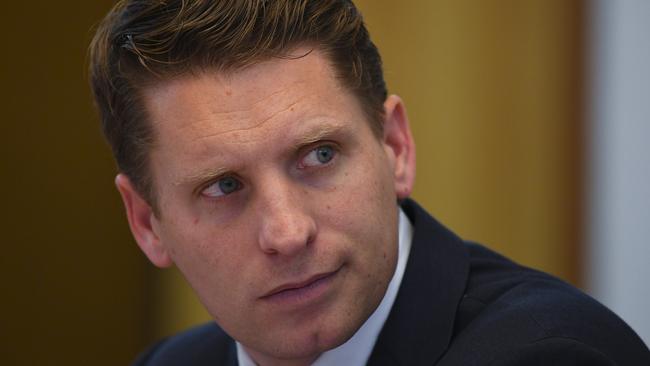MPs Andrew Hastie and James Paterson banned from China
Beijing has banned two outspoken Australian politicians from travelling to the country after they criticised China.

Beijing has banned two outspoken Australian politicians from travelling to the country amid signs diplomatic tensions between the Morrison government and the leadership of the Chinese Communist Party are continuing to escalate.
Policy think tank China Matters has been ordered to cancel an invitation to Liberal MP Andrew Hastie, the chairman of the parliamentary intelligence and security committee, and party colleague James Paterson to join a study group that was bound for Beijing in December.
The snub, revealed in a press release, suggests Beijing will no longer tolerate potshots from Australian politicians aimed at highlighting the Communist Party’s repressive regime and long list of human rights abuses.
“At this time, Mr Hastie and Senator Paterson are not welcome on a China Matters study tour to Beijing,” China Matters chief executive Alistair Nicholas said in a statement.
“We regret the decision of the government of the People’s Republic of China … the third China Matters study tour, planned for 9-11 December, has been postponed.”
Mr Hastie and Senator Paterson in a joint statement said their “frankness about the Chinese Communist Party” was behind the diplomatic snub.
“We had looked forward to learning from the Chinese people about their culture, history and perspective during this visit,’’ they said. “We are particularly disappointed that the apparent reason why we are not welcome in China at this time is our frankness about the Chinese Communist Party.
“Despite this, we will always speak out in defence of Australia’s values, sovereignty and national interest. We look forward to a time when the Chinese government realises it has nothing to fear from honest discussion and the free exchange of ideas.”
Mr Hastie made international headlines in August when he compared the rise of China to that of Nazi Germany in a column for Nine newspapers.
He labelled the West’s belief that economic liberalisation would lead to China’s democratisation as “our Maginot line” — in reference to the concrete fortifications built by the French during World War II in an attempt to stop Germany from invading.
“It (the belief China would be democratised) would keep us safe, just as the French believed their series of steel and concrete forts would guard them against the German advance in 1940. But their thinking failed catastrophically,” Mr Hastie wrote.
“If that’s the price for speaking out, for being honest with our constituents about our concerns about our relationship with China, then that’s the price that I’m sure Andrew is willing to pay, and I’m willing to pay,” Senator Paterson told the ABC on Friday night.
“Hong Kong is one of the most amazing places in the world and what is happening there is an absolute tragedy and I believe the Communist Party bears some responsibility for that.”
Mr Hastie again fell afoul of China in October when he publicly denounced China’s “repressive surveillance state”.



To join the conversation, please log in. Don't have an account? Register
Join the conversation, you are commenting as Logout